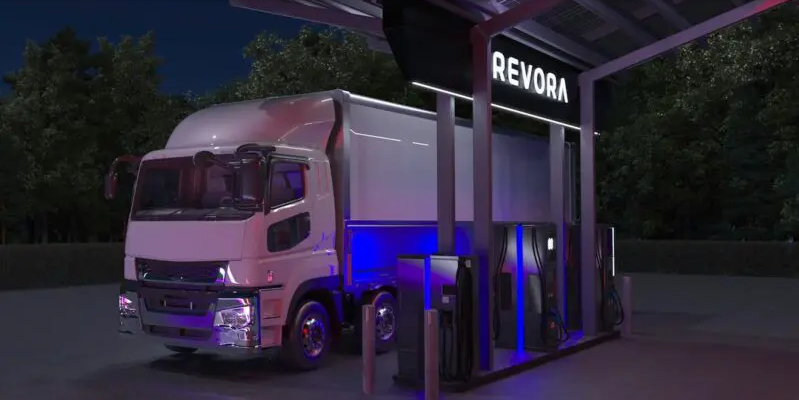
Australian refrigerated truck assembler Eurocold is launching a spinoff company Revora to develop and build all-electric refrigerated trucks in a factory based in Brisbane.
The company says that the goal of Revora is to empower the refrigerated transport industry towards a sustainable future.
In a press release the company says “Australian technology and ingenuity is central to this mission, with several key components (i.e. chassis, fridge, body etc) sourced from best of breed operators in Australia and internationally.”
Eurocold CEO and Revora’s managing director Avraam Solomon said “Revora is a completely separate and new brand to Eurocold – aimed at future-proofing the sustainability of the refrigerated transport industry,”
Revora’s experienced team keen to accelerate the transition
Reveroa’s new general manager is Nathan Gore-Brown who has been involved with electrification of transport for many years. After working for Jaguar and Aston Martin in the UK early in his career, Gore-Brown launched Tesla’s initial flagship Brisbane outlet. He then worked for consultant firm MOV3MENT from 2018 advising councils, state government and companies on how to electrify their fleets.
“Refrigerating the load takes energy and this can be over 25% more than a typical box truck. Efficiency is key, we are laser focussed on driving energy waste out of our designs to maximise the operation cases for our trucks.” said Gore-Brown.
Gore-Brown will officially launch Revora in an electric vans and trucks forum at the Fully Charged Live show in Sydney this Saturday but Revora’s first refrigerated electric truck won’t be on display until the Brisbane Truck Show, May 18-21.
Delivery trucking needs whole system solutions
Revora says its offering includes:
Initial consultation on current fleet make-up and measurement of diesel usage
Suitability to cross over to electric refrigerated trucks
Supply of optimised zero-emission refrigerated commercial vehicles
energy/charging stations (optimised for fleet size and operations model)
staff training; and
on-call support
To optimise efficiency once going electric, Revora is devising a technology-led process that will assist fleet owners to ensure they are maximising opportunities through telematic data tracking on the vehicles and software to monitor energy systems.
With the majority of refrigerated transport deliveries being ‘last mile’ deliveries and in urban areas, Gore-Brown explained that electric trucks are perfect for this duty cycle.
“EVs are particularly well suited to urban and stop-start tasks,” he said. “This is down to their ability to recapture energy through regenerative braking. Typically, the refrigerated transport industry has a large portion of the fleet running last mile delivery and that’s where electric trucks excel.
“Last mile refrigerated trucks a great for electrification, clean and quiet running around urban streets. The challenge they have is with pairing the operation (driving task) to the vehicle’s energy and capability. We know not all operations will fit now but many do.”
“In addition to this, as we move towards government-mandated net zero emission targets, electric trucks will provide opportunities for our customers to gain new contracts due to businesses wanting to reduce their carbon footprint.”
Gore-Brown says that they don’t see many in the industry relying on public charging but rather destination charing will be set up to utilise idle times during loading and unloading.
Asked how many units per year does Revora hope to sell Gore-Brown says “We are really focussed on getting this right, this may mean we need to be a little patient, but we think parts for the food services transport industry is ready and we will go with them.”
“As will all electric vehicles, large and small, vehicle availability will be the major tempering factor in our roll out. We will focus on small clusters of rigid electric refrigerated trucks of all sizes to suit our customer’s needs.” he said.
The company says that over the past 12 months it has had lots of positive discussions with the industry. Interest has been shown from small bespoke food companies to well known companies with large fleets.
Gore-Brown says “The message that is common is they are keen to learn but they are just not sure how, that’s were we can help de-risk the transition.”